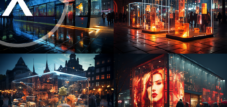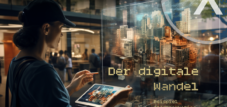2024: Municipality and city marketing – external representation and external perception – what you have to pay attention to and what is important
Language selection 📢
Published on: December 20, 2023 / update from: December 20, 2023 - Author: Konrad Wolfenstein

2024: Municipality and city marketing – external representation and external perception – Image: Xpert.Digital – AI & XR-3D rendering machine (art photo/AI)
🏙️ City marketing: The importance for municipalities and successful brand management
🌟 The importance of city marketing 🏢
City marketing is extremely important for municipalities of all sizes. It's not just about an appealing external image, but also about the external perception of the city, which is largely shaped by targeted marketing strategies. Like almost every marketing area, city marketing requires careful planning and implementation so that the desired perception matches the actual appearance.
🎯 Brand building in city marketing 👥
The central aspects of city marketing include branding, often also referred to as “branding”. Similar to the entrepreneurial area, city brand formation cannot be done overnight; It requires a vision that includes long -term goals and strong recognition value. Creating a brand means presenting a unique promise that reflects the identity and values of the city. It is essential for success to emphasize the special and characteristic - it is about the differentiation from other cities and thus about positioning in the “market of cities”.
🔍 The comprehensive analysis: basis of city marketing 📊
The basis for successful city marketing is a comprehensive analysis. This takes a close look at what the city has to offer and what sets it apart from others - be it cultural institutions, historical buildings, special events, the economic structure or social projects. But deficits and potential also play a role in promoting strengths and gradually expanding weaknesses.
🚀 Strategy development: planning for success 📈
The analysis phase is followed by strategy development. A well-thought-out concept that contains goals and measures is essential. This includes clearly defining the target group: who does the city want and can reach? Interested parties can be, for example, investors, tourists, new residents or even our own residents. The more precisely the target group is defined, the more effectively marketing measures can be planned and implemented.
💬 Communication in city marketing: spreading the message 💡
Communication is the be-all and end-all in city marketing. Targeted communication conveys the desired image of the city and promotes a positive image. A mix of classic advertising, online marketing, event marketing and public relations is required. It is important that the messages are consistent and communicated uniformly across all channels - this creates trust and authenticity.
🌐 The importance of the Internet in city marketing 💻
The Internet offers enormous possibilities as a platform for city marketing. Direct and interactive communication with target groups can be established via your own website, social media channels, apps or online advertising. In times when information and images travel around the world in seconds, an appealing and user-friendly online presence is essential. Search engine optimization (SEO) also plays an important role in making the city's offerings easy to find.
📰 Traditional marketing tools and citizen participation 📣
In addition to digital marketing, traditional marketing tools remain important. Print media, posters, brochures or direct contact through trade fair appearances or city tours support the entire marketing concept and help to build an emotional bond. A historic marketplace or a modern cultural center can often only be truly experienced through personal experiences.
In addition, citizen participation is an increasingly important factor in city marketing. Involving residents in the development of concepts increases identification with the city and creates a sense of community. Local actors can act as multipliers and help spread the brand message credibly and authentically.
✅ Implementation, evaluation and cooperation: success factors for city marketing 🔄
For external perception, it is also crucial that strategies are not only developed, but also consistently implemented and continuously evaluated. Effective city marketing is dynamic and adapts to current developments and circumstances. It is important to react flexibly to changes in market conditions and adapt the marketing concept if necessary.
Another important aspect is networking and cooperation both within the administration and with external partners. City marketing works best when different actors such as economic development, tourism offices, cultural institutions and local businesses work together.
💼 Economic development, tourism marketing and cultural promotion 👥
Economic development is a crucial part of city marketing. They have the task of improving the economic conditions and thus attracting investments into the city. Economic development can directly contribute to the attractiveness of a city through targeted measures such as the development of commercial space or support programs for start-ups.
Tourism marketing is also a mainstay of city marketing. The aim here is to establish the city as a travel destination, be it through marketing unique sights, organizing events or through strategic cooperation with tour operators and hotels. The art lies in highlighting what is special about the city in such a way that it becomes irresistible to potential guests.
But culture also plays a crucial role in external perception and city marketing. Promoting culture and developing a diverse cultural offering contribute to the quality of life in the city and also make it attractive for visitors. These can be music festivals, museums, galleries or theaters that not only represent intellectual and cultural exchange, but also represent soft location factors that can shape the image of a city.
💚 Sustainability in city marketing: responsibility for the future 🌱
For the sustainable external perception of a city, it is essential that all marketing activities are credible and authentic. A city must also be able to keep the promises of its marketing. This happens, for example, through quality-assured services, infrastructure that meets the needs of citizens and visitors, and through transparent and participatory decision-making processes.
📊 Success monitoring and international perspectives 🌍
In order to ensure the effectiveness of city marketing, ongoing success monitoring is necessary. This requires collecting and evaluating data, for example through visitor numbers, tourism statistics, feedback from surveys or by analyzing length of stay and engagement on social media.
City marketing is also subject to sustainability. Strategies should therefore not only be oriented at short notice, but also have an eye on future generations. It is about reconciling economic goals with social and ecological aspects. A “green city” can, for example, build an attractive and modern image through sustainable traffic concept, use of renewable energies and green space promotion.
In an international context, city marketing also opens up a wide range of possibilities. On the one hand, a city's visibility can be increased on the global stage, promoting investment, tourism and exchange on a cultural and economic level. On the other hand, city partnerships and international collaborations can increase awareness and contribute to networking.
🏢 Creativity, planning and commitment in city marketing 🌆
In conclusion, city marketing is a process that requires creativity, strategic planning and the commitment of everyone involved. It must be able to tell a story that fascinates and attracts both residents and visitors. A clear profile, a target group-specific approach and the development of an emotional connection are the cornerstones of successful city marketing. Only through holistic and consistent brand management can cities survive and position themselves successfully in an increasingly competitive environment.
📣 Similar topics
- 💥 Importance of city marketing for municipalities of all sizes 😃
- 🏢 Branding in city marketing: vision and values 💡
- 🔍 Analysis phase in city marketing: Identification of strengths and potential
- 🎯 Target group definition in city marketing: Who do we want to reach?
- ✉️ Communication in city marketing: consistency and authenticity
- 💻 Digital city marketing: opportunities and challenges
- 🌆 Traditional and modern marketing tools in city marketing
- 💪 Citizen participation in city marketing: The power of community
- 📈 Consistent implementation and evaluation in city marketing
- 🤝 Networking and cooperation in city marketing: collaboration for success
#️⃣ Hashtags: #city marketing #branding #target group definition #communication #networking
🎯🎯🎯 Benefit from Xpert.Digital's extensive, fivefold expertise in a comprehensive service package | R&D, XR, PR & SEM

AI & XR 3D Rendering Machine: Fivefold expertise from Xpert.Digital in a comprehensive service package, R&D XR, PR & SEM - Image: Xpert.Digital
Xpert.Digital has in-depth knowledge of various industries. This allows us to develop tailor-made strategies that are tailored precisely to the requirements and challenges of your specific market segment. By continually analyzing market trends and following industry developments, we can act with foresight and offer innovative solutions. Through the combination of experience and knowledge, we generate added value and give our customers a decisive competitive advantage.
More about it here:
🌐 Augmented Reality with Metaverse Marketing: Augmented and Virtual Strategies🥽👀 for Cities 🏙️ and Countries
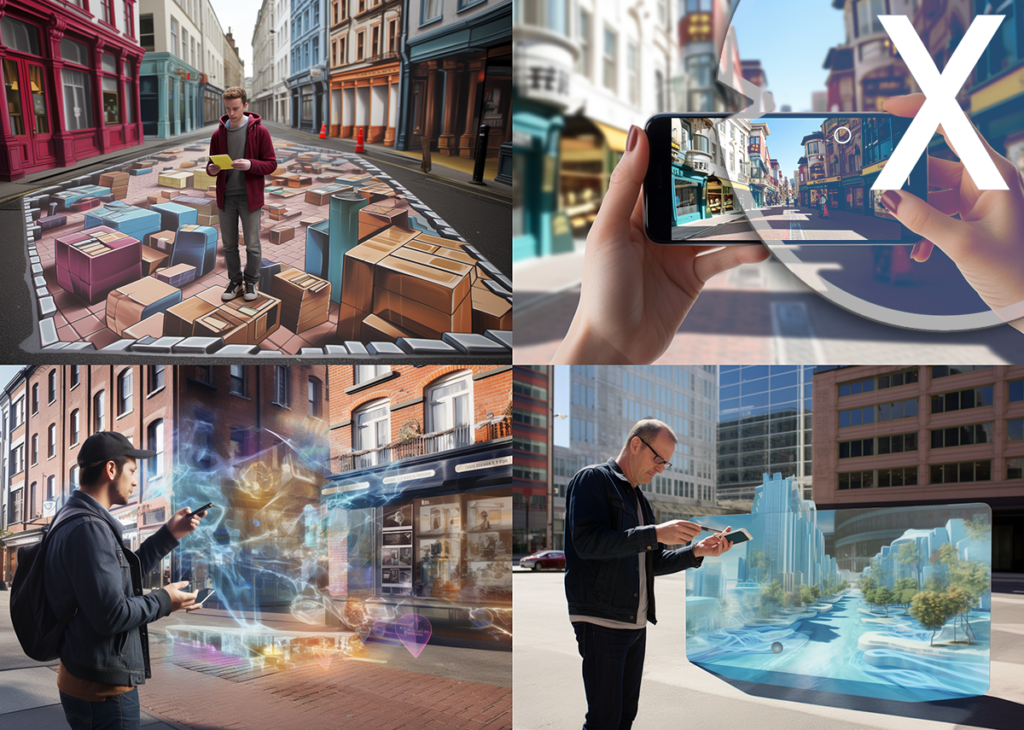
2024: Municipality and city marketing: The adjustment or even realignment of marketing - Image: Xpert.Digital - AI & XR-3D rendering machine (art photo/AI)
🌍🔮 You want to know how extended reality (XR) and the metaverse can revolutionize marketing for cities, towns, municipalities or even entire countries and are relying on adapting or realigning your strategies in order to keep up with the digitally advancing world lose?
The transformation of marketing through XR and the metaverse
🔍 The world of marketing is currently undergoing a profound transformation. XR technologies allow potential visitors, investors and citizens to virtually explore places even before they are physically present. These technologies allow users to navigate an augmented or fully virtual environment that enriches physical reality with digital information or entirely new digital worlds.
Augmented reality in city marketing
🌆 Augmented reality involves overlaying the real world with digital information such as images, data and visual cues. For example, visitors to a city could use their smartphones or special AR glasses to view historical information as they view landmarks or see reviews of restaurants as they walk past them. City maps could be supplemented with 3D markers and directions that are superimposed on the real environment, offering tourists an interactive exploration tour.
Mixed reality as a bridge between real and virtual
🌐 Mixed reality goes one step further and combines the real world with virtual elements so that they can interact with each other. This can be used, for example, for educational purposes to bring complex historical events to life in original locations. Visitors could experience historical battles from the participants' perspective or immerse themselves in a recreated version of an ancient city superimposed on the real landscape.
Virtual reality for immersive experiences
🌈 Finally, virtual reality offers the opportunity to completely immerse yourself in a virtual world. For the marketing of cities and regions, this means the opportunity to take potential visitors into a completely designed experience. Consider a virtual tour of the region that allows you to experience the beauty of the landscapes, cultural offerings and local shops without being there. This can be particularly beneficial when planning trips or purchasing property, as it provides a tangible impression that is not possible through traditional photos or videos.
The Metaverse as a marketing platform
🚀 The Metaverse, understood as a kind of collectively shared virtual space that is shaped in many ways by digital technology and used by people worldwide, can fundamentally change marketing. A country or community could create a permanent virtual space in the Metaverse where events take place, people meet and interact, or where virtual sightseeing is offered. It could represent a new level of community building and enable communities or regions to have a global presence.
💫 Through the Metaverse, a city could host a digital festival that simultaneously attracts visitors from all over the world. It could also become a central meeting point for digital nomads or provide a platform for local artisans and artists to showcase and sell their wares worldwide.
Marketing strategies for the digital future
🔮 Incorporating XR and the Metaverse into marketing requires a strategic realignment. It's no longer just about conveying information, but about creating experiences, telling stories and arousing emotions.
Storytelling and emotionalization
📚 Storytelling has never been as important as in the digital age. VR experiences allow stories to be told in an engaging and interactive way. For example, a city might present its story through immersive time travel, brought to life with characters from the past. The emotionalization of these experiences creates a strong connection between the Stadt/Land brand and its target groups.
Interactive and personalized experiences
✨ Every user is unique and so should the digital experiences offered. Personalized tours and offers based on user interests can create stronger engagement than ever possible with static websites or brochures. An interactive city guide in the Metaverse could adapt to the user's preferences and provide a tailored experience.
Sustainability and accessibility
🌿 Digital technologies also offer the opportunity to make marketing more sustainable and accessible. Virtual tours reduce the need for physical presence and associated resource consumption and emissions. At the same time, they enable people with physical disabilities or limited travel options to access experiences that would otherwise be out of reach.
Integration of real-time data and feedback
📊 The integration of real-time data makes it possible to dynamically adapt offers to user behavior and preferences. Feedback can be obtained and implemented directly to continuously improve the user experience.
XR revolution
🚀💥 The digital revolution, led by XR technologies and the Metaverse, offers enormous opportunities for the marketing of cities, communities and countries. By creating immersive, emotional and interactive experiences, bonds with target groups can be strengthened, attractiveness can be increased and the image can be sustainably shaped. It is now up to those responsible to use these technologies strategically and cleverly and thus to explore new paths that transfer the fascination of the place into the digital world.
📣 Similar topics
- 🌍 The Future of Marketing: XR and the Metaverse in Focus
- 🚀 The Marketing Revolution: How XR and the Metaverse Are Changing the Rules of the Game
- 📈 XR marketing: New horizons and opportunities for cities and communities
- 🔮 Virtual reality meets marketing: a new era of experience
- 🌆 XR technologies in city marketing: connecting digital worlds and reality
- 🌐 The Metaverse as a marketing platform: Where the digital and real worlds merge
- 🎭 The Power of Immersion: XR and the Metaverse in Marketing
- 🏞️ Virtual tour: Experience cities and regions in an innovative way
- 🌟 The metaverse for marketing professionals: challenges and potential
- 💥 Marketing Revolution: How XR and the Metaverse are revolutionizing the industry
#️⃣ Hashtags: #XRMarketing #Metaverse #Immersion #ZukunftDesMarketings #DigitaleTransformation
🗒️ Xpert.Digital: A pioneer in the field of extended and augmented reality
🚀✨ Extended Plan: Augmented Reality Marketing – If the Metaverse is currently still a size too big | Preparation & planning
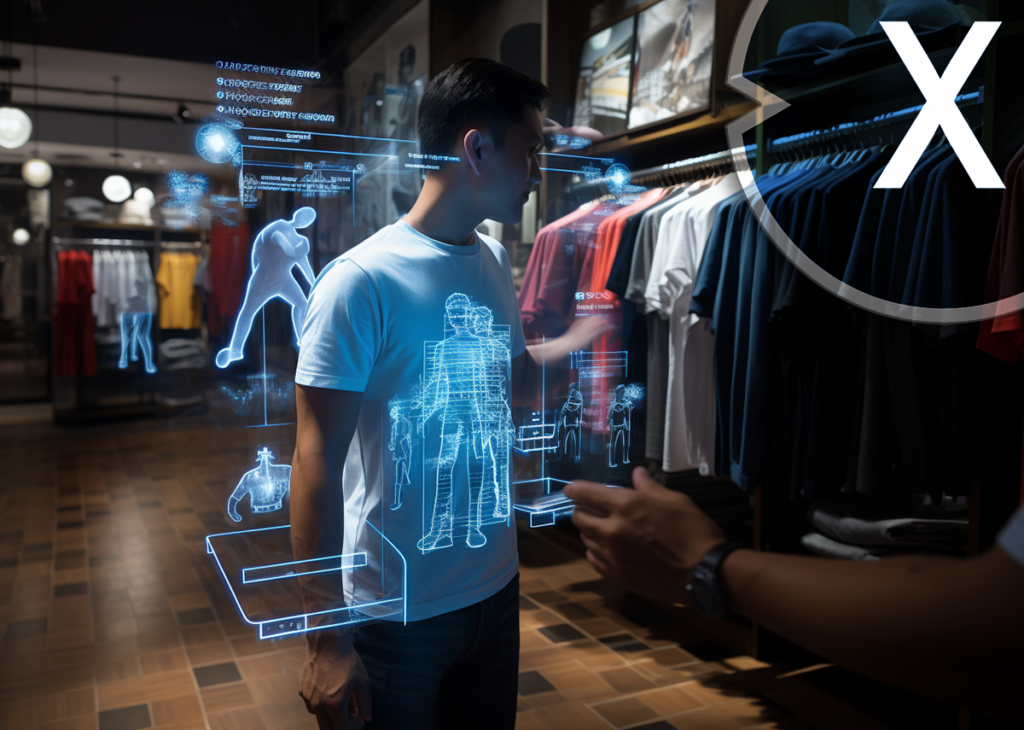
Extended Plan: Augmented Reality Marketing – Preparation & Planning – Image: Xpert.Digital – AI & XR 3D Rendering Machine (art photo/AI)
In our ever-changing digital world, the metaverse has developed into a concept full of promise and visions of the future. Companies around the world are looking with fascination at the potential that this new virtual space offers. But for many, the Metaverse, a parallel universe in which users can interact in entirely computer-generated environments, is still too big an undertaking. It raises questions about costs, technical challenges and the need for a fundamental strategic reorientation. These considerations can seem daunting, especially for small and medium-sized businesses (SMEs) – not least because of the significant resources that integration into the metaverse can require.
More about it here:
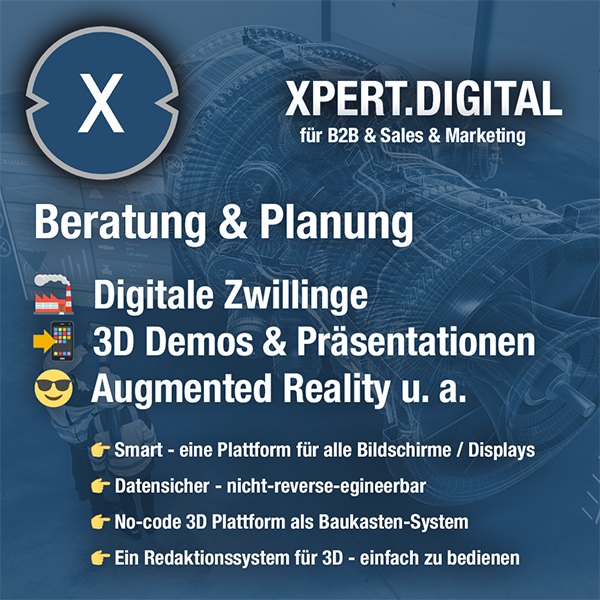
We are there for you - advice - planning - implementation - project management
Xpert.Digital - Pioneer Business Development
Smart Glasses & KI - XR/AR/VR/MR industry expert
Consumer metaverse or meta -verse in general
If you have any questions, further information and advice, please feel free to contact me at any time.
I would be happy to serve as your personal advisor.
You can contact me by filling out the contact form below or simply call me on +49 89 89 674 804 (Munich) .
I'm looking forward to our joint project.
Xpert.Digital - Konrad Wolfenstein
Xpert.Digital is a hub for industry with a focus on digitalization, mechanical engineering, logistics/intralogistics and photovoltaics.
With our 360° business development solution, we support well-known companies from new business to after sales.
Market intelligence, smarketing, marketing automation, content development, PR, mail campaigns, personalized social media and lead nurturing are part of our digital tools.
You can find out more at: www.xpert.digital - www.xpert.solar - www.xpert.plus







